When wastewater flows into your septic tank, solid waste settles at the bottom and lighter materials float to the top. Over time, these solids accumulate and can overflow into the drain field.
This can cause clogs, environmental contamination, and other problems. Regular septic tank pumping eliminates accumulated solids and keeps your septic system functioning properly. Contact Septic Pumping Fresno for professional help.
Over time, the septic system’s anaerobic decomposition process reduces the volume of solid waste. The sludge layer and to a lesser extent the scum layer gradually decrease in volume as they are broken down and compacted by the septic tank’s bacteria. If this process is not interrupted, sludge and scum layers can accumulate to the point that they begin to overflow into the drainfield. This can result in poorly treated wastewater flowing into groundwater supplies and contaminating soil, and can lead to premature failure of the septic tank or the drainfield.
During septic pumping, the septic system professional removes the septic tank cover and inserts a hose that connects to a large vacuum truck. The vacuum truck creates negative pressure inside the tank, which draws sludge and scum into the hose and out of the tank through a suction hose. After the tank is emptied, the professional replaces the septic system cover and inspects the condition of the septic tank to identify any issues that may need attention in the future.
When a septic system is regularly pumped out, accumulated solids are removed from the home’s sewage system, eliminating odors and creating a healthier environment for household members. In addition, a clean and well-functioning septic system can help increase property value, as potential buyers will be less hesitant to purchase a home with an unknown septic history.
As a homeowner, there are several things that you can do to maintain your septic system and reduce the frequency of required pumping. For example, limiting the use of garbage disposals can significantly reduce the amount of grease and solids that enter the system. Additionally, spreading water-intensive activities throughout the day rather than performing several loads of laundry or showers back-to-back can help prevent septic system overloading.
It is also important to keep accurate and complete maintenance records. This can be very beneficial if the property is ever put on the market, as prospective buyers will want to know the septic system’s history and maintenance schedule. Keeping accurate and detailed records also makes it easier to locate the septic tank, reducing the risk of accidentally digging into gas pipes or other utility lines.
Sewage Backups
During the pumping process, the vacuum truck creates negative pressure inside the tank to pull sludge up into the hose. This is when your system feels the most strain. During this time, it is best to conserve water usage and avoid doing activities like showering or laundry as much as possible to help the septic system recover from the stress.
After a few hours, you can resume normal water usage. However, it is important to monitor your household wastewater to ensure that the septic system does not experience any problems with sewage back ups or other issues. If you do notice any sewage backups or other issues, it is best to contact an expert right away to prevent further damage and protect your family’s health.
Wastewater from your toilets (called blackwater) and sink, tub, and shower drains (called greywater) runs into a drainage pipe that leads to the septic system. Solid materials sink to the bottom of the tank and undergo bacterial digestion, while fats, oils, and grease float to the top and form a layer of scum. The liquid effluent then flows from the septic tank into the drainage field, where it is absorbed into the soil.
The wastewater from your home needs to be pumped regularly so that the solid waste doesn’t build up to a point where it begins to overflow into the drainage field. If this happens, it can clog your plumbing and cause sewage to back up into the house. It can also contaminate the surrounding environment and pose a health risk to your family.
Regular septic tank maintenance reduces the need for system replacements, which can be very expensive. It also protects your property value, preventing the septic tank from being a eyesore and detracting from the curb appeal of your home.
If you have a septic tank, keeping it properly sized and maintaining proper water usage are the best ways to keep it in good working condition. It is important to avoid flushing items that should not go into the septic system, such as paper towels and wipes. These products can clog the pipes that lead into the tank and the septic system itself.
Environmental Contamination
Septic tanks are used in residential and commercial properties where a public sewer system isn’t available or accessible. When they’re well-maintained, septic systems treat wastewater and filter it into the drain field for safe release into groundwater or surface water bodies. But when a septic tank is neglected, it can lead to sewage backups and environmental contamination.
In the event of a septic system failure, untreated sewage can seep into the environment and contaminate water sources with bacteria, viruses, and toxic heavy metals. In addition, excessive nitrates can enter surface water bodies and create oxygen-depleted dead zones that threaten aquatic life.
Ideally, a properly functioning septic system should degrade organic waste through natural processes and safely release filtered effluent into the drain field. However, this isn’t always possible, as the septic tank may fill up with solid wastes that can clog and overflow the leach field. Septic systems do a good job of removing some chemicals from wastewater, but other contaminants slip through. These include acetaminophen, caffeine, and alkyphenols (found in cleaning products). Septic systems are less effective at removing pharmaceuticals, including a carcinogenic flame retardant called TCEP and anti-epilepsy drug carbamazepine.
Signs of a overloaded septic system include slow-draining sinks and toilets, foul odors, and wet spots in the yard. If you experience any of these issues, contact a septic service provider to get your tank pumped.
Pumping involves a large vacuum truck that removes the accumulated sludge and scum from your septic tank and transfers it to a designated treatment facility for disposal. During this process, the technician also cleans and inspects the tank to identify any signs of damage or deterioration that require repair.
Performing routine septic tank pumping prevents overflows, unpleasant odors, and sewage backups that can damage your property and affect indoor air quality. It also protects your home’s value and contributes to the health of the surrounding environment. In addition, keeping complete maintenance records will make your property more appealing to potential buyers.
Health Hazards
Keeping a septic tank pumped regularly protects you and your family from serious health concerns. Failing septic systems leak raw sewage into the environment, carrying bacteria that can cause illnesses like diarrheal diseases. These diseases are especially dangerous for children, the elderly, and those with weakened immune systems. If septic system failure causes a clog, harmful fumes may leak into the home and contaminate drinking water.
Failing septic tanks and drain fields can also contaminate groundwater. If you use a well for your household water, this contamination can result in contaminated drinking water that contains harmful bacteria and viruses. This contaminated water can cause illness in anyone who drinks it. Regular septic tank pumping helps prevent this risk by reducing the amount of waste that goes into the septic system and groundwater.
When a septic system is full, it produces gases like methane and hydrogen sulfide that can be toxic to humans. These gases are produced when organic waste breaks down in the septic tank. Exposure to these gases can lead to respiratory issues like shortness of breath and headaches if exposed to high levels for extended periods of time.
If you live in a rural area, failing septic tanks can pollute local groundwater. This can lead to tainted drinking water that can cause gastrointestinal illness, diarrhoea, and other diseases if consumed. Regular septic tank pumping helps reduce the chance of groundwater contamination by reducing the amount of solid waste that enters the septic system and sewage treatment system.
A septic tank inspection is a crucial part of maintaining your septic system. A professional will use specialized equipment to clean out the tank and inspect its components for problems such as clogs or leaks. This inspection can help you avoid expensive repairs and save money on energy costs by detecting and fixing problems early on.
A professional septic tank inspection should include a visual examination and the use of specialized equipment to identify trouble spots in hard-to-reach areas. Regular septic tank pumping, proper waste disposal, and water conservation can further reduce the likelihood of costly system failure and protect your family’s health.
